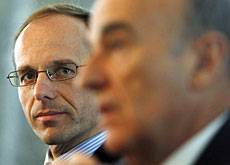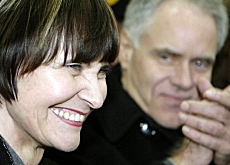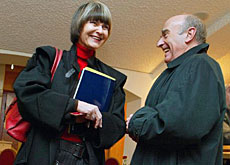Luxembourg stands by Switzerland over taxation

Luxembourg has defended Switzerland's position in the ongoing dispute between Bern and the European Union over corporate tax breaks.
In an interview with the Zurich-based Tages-Anzeiger newspaper on Tuesday, Luxembourg Finance Minister Luc Frieden said attacks on Swiss cantonal taxation stemmed from a “poor knowledge of the federal system” and “jealousy”.
The interview followed talks between Frieden and his Swiss counterpart, Hans-Rudolf Merz, in Bern on Tuesday which centred on financial and taxation issues.
“When a growing number of individuals and companies leave a country, the country itself should try and improve its own working and living environment rather than accuse others,” Frieden told the Tages-Anzeiger.
Switzerland has been embroiled in a corporate tax dispute with the EU since September 2005. Many EU countries are angry that tax revenues are being lost as companies relocate to Switzerland to take advantage of lower levies.
In early January Arnaud Montebourg – a French socialist politician and spokesman for presidential candidate Ségolène Royal – urged the EU to crack down on Swiss cantons that set low tax rates to entice companies and individuals to relocate from other countries. Montebourg also took a swipe at Luxembourg, Liechtenstein and Monaco.
“Those who make such statements are defending higher taxes,” said Frieden. “And the fact that certain countries have lower tax rates than others should not automatically be seen as unfair tax competition – let alone banditry,” he added, in response to Montebourg’s comments.
Side by side
Speaking after his talks with Frieden, Merz hit back at claims that Switzerland’s low tax regime violates the terms of a 1972 Free Trade Agreement.
“Attacking cantonal taxation is the same attacking Swiss sovereignty,” he said.
Merz commented that both Switzerland and Luxembourg had strong financial centres and common interests.
Frieden echoed this, saying Luxembourg would be “standing alongside Switzerland” if there had to be tougher EU discussions on taxation.
René Matteotti, a tax law professor at Bern University, told Swiss German public radio that this was the first time an EU member country had vocally supported the Swiss position on taxes.
Matteotti said that as long as there was no consensus within the EU, Brussels was unlikely to take measures against Switzerland.
“This is a clear sign that the discussion over tax competition has not been resolved within the EU,” he said.
The public display of support between the two countries took place after calls by Swiss President Micheline Calmy Rey for more “respect” following Montebourg’s criticism.
“The Swiss tax rules are transparent. It is up to the Swiss voters to decide if they should be changed. We don’t need any advice,” she told Swiss television on Friday.
She said that furthermore Switzerland was the EU’s second-largest customer with a negative trade balance with the community.
Leuthard’s stance
Economics Minister Doris Leuthard took a slightly different position on tax breaks in a television interview on Tuesday night.
She denounced different tax practices that were “discriminatory for the Swiss”, highlighting the example of French pop legend, Johnny Hallyday, who recently moved to Switzerland to avoid the burdensome tax regime of his home country.
However, the cabinet on Wednesday reaffirmed its approval of the current regulations, including lump sum taxation for foreign residents in Switzerland and differing cantonal fiscal regimes.
Hallyday is said to pay one tenth the amount of tax that Swiss tennis star Roger Federer pays, despite similar earnings. According to the Swiss tabloid newspaper Blick, both earn around SFr10 million ($8 million) but Federer pays SFr3 million in tax compared with Hallyday’s SFr300,000.
swissinfo with agencies
Swiss cantons are free to set their own tax rates within the framework of the Tax Harmonisation Act, brought into force in 2001.
Selected cantonal tax rates from a KPMG report published on November 1, 2006: Obwalden 13.1%, Schwyz 15.6%, Zug 16.4%, Zurich 21.3%, Graubünden 29.1%.
Article 23.iii of the 1972 Free Trade Agreement states that: “any public aid which distorts or threatens to distort competition by favouring certain undertakings or the production of certain goods” is “incompatible with the proper functioning of the Agreement”.

In compliance with the JTI standards
More: SWI swissinfo.ch certified by the Journalism Trust Initiative


You can find an overview of ongoing debates with our journalists here. Please join us!
If you want to start a conversation about a topic raised in this article or want to report factual errors, email us at english@swissinfo.ch.